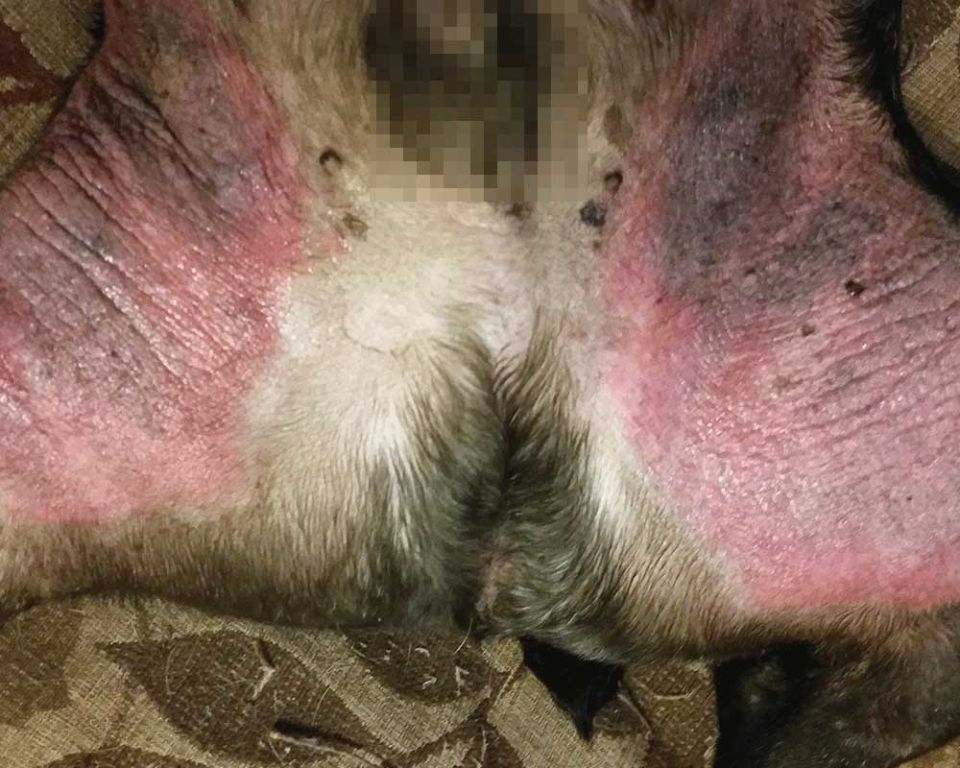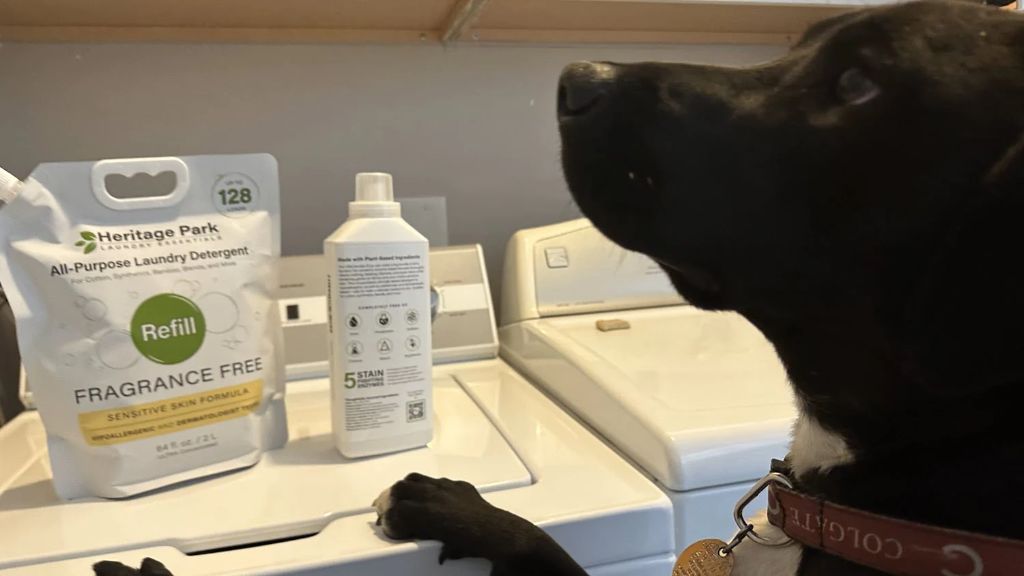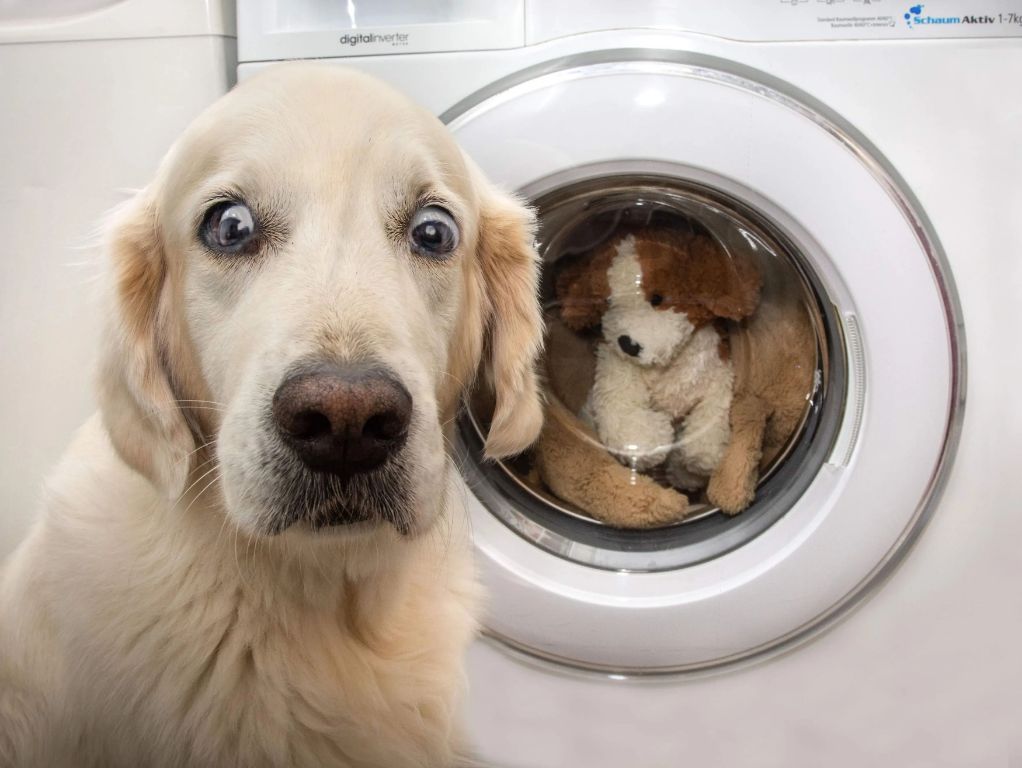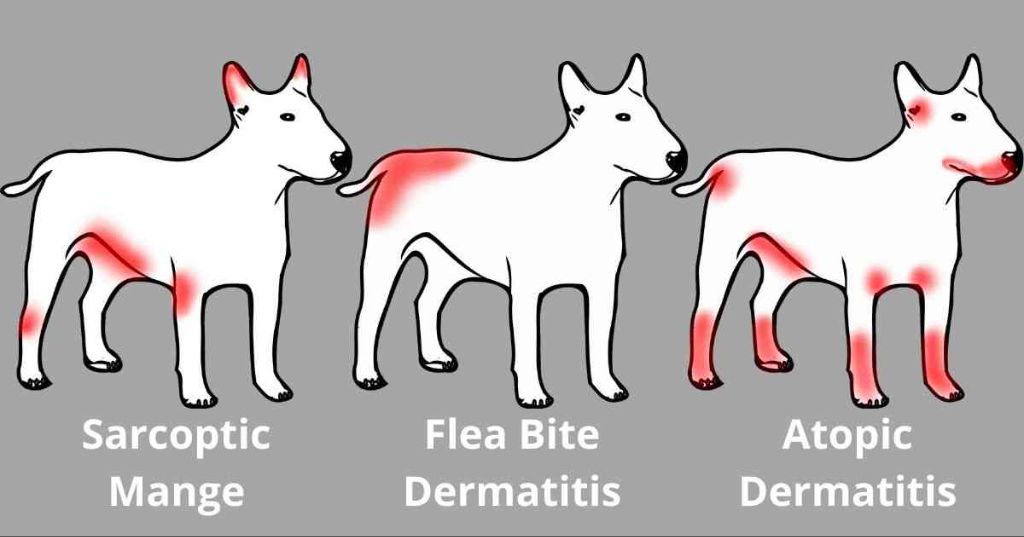Importance of Proper Laundry Care for Dogs
For most dog owners, keeping your pup clean and smelling fresh is a top priority. But when it comes to doing laundry for dogs, many owners wonder if special detergents or care is needed. Proper laundry hygiene is essential for your dog’s health and comfort. The right products and techniques can help relieve skin irritation, control odors, and maintain clean bedding and accessories.
In this article, we’ll explore the benefits of proper laundry care for dogs and provide tips to keep your furry friend clean and comfortable.
Dogs’ Sensitive Skin
Dogs have more sensitive skin than humans for a few key reasons. First, their skin has a weaker barrier function compared to human skin, making it more permeable to potential irritants. Dogs also have a thinner epidermis and dermis, so their skin overall is more delicate and prone to damage (1). In addition, dogs have fewer oil producing glands than people, leading to dryer skin that can crack and allow allergens in (2).

Some common skin conditions in dogs that regular laundry detergents can aggravate include:
- Allergic dermatitis – an itchy inflammation caused by contact allergies
- Atopic dermatitis – environmental allergies leading to itchy, red skin
- Hot spots – moist, oozing sores from excessive licking and chewing
- Mange – parasites burrowing into the skin cause hair loss and irritation
The detergent residues, fragrances, and chemicals left in fabrics can be absorbed through dogs’ thin sensitive skin, triggering these conditions. It’s important to use a gentle, hypoallergenic detergent formulated for pets.
Harmful Ingredients
Some common ingredients in regular laundry detergents can be irritating or even toxic to dogs. These include:
- Fragrances – Artificial fragrances contain chemicals like phthalates that can cause skin irritation or allergies in dogs (Source).
- Optical brighteners – These make clothes appear brighter but can be toxic if ingested in large amounts (Source).
- Surfactants – Detergents like sodium lauryl sulfate can cause gastrointestinal irritation if ingested (Source).
- Bleach – Sodium hypochlorite is highly irritating to skin, eyes, and mucous membranes (Source).
Exposure to these chemicals, whether ingested, inhaled, or skin contact, can cause skin irritation, gastrointestinal distress, respiratory issues, and other problems in dogs.
Hypoallergenic Formulas
Hypoallergenic detergents are specially formulated to be gentle on dogs’ sensitive skin. They are free of harsh chemicals, dyes, and fragrances that can cause allergic reactions or skin irritation in dogs. Instead, they use gentler cleaning agents to get fabrics clean without stripping away natural oils or damaging the skin barrier.

Some of the key ingredients that make hypoallergenic detergents dog-friendly include:
- Plant-based surfactants like decyl glucoside – These naturally derived cleansers are much less irritating than conventional detergent chemicals.
- Colloidal oatmeal – Soothes itchy, inflamed skin and adds moisture.
- Natural fragrances like lavender oil – Provide a light scent without synthetic perfumes.
- Aloe vera – Calms and hydrates sensitive skin.
- Vitamin E – An antioxidant that supports skin health.
By avoiding harsh soaps, dyes, and artificial fragrances, these hypoallergenic formulas clean clothes while being gentle on dogs’ more delicate skin.
Alternatives to Liquid Detergents
There are some natural and non-toxic alternatives to traditional liquid laundry detergents that can be safer for dogs. Options like soap nuts, vinegar, and baking soda can get clothes clean without harmful chemicals. According to DogSpotted, soap nuts are a plant-based alternative containing natural saponins that create suds to lift dirt and grime.
White vinegar is another alternative that helps remove stains and odors from fabric. Per Anasazi Veterinary Clinic, adding 1⁄2 to 1 cup of white vinegar to the wash cycle can naturally clean clothes. Baking soda also has cleaning properties and can be added along with vinegar for an extra boost.
The main benefits of using these types of natural detergent alternatives are that they avoid harsh chemicals found in many mainstream laundry products. This helps minimize the risk of skin irritation or allergies in dogs that have frequent contact with laundry.
Steps for Washing
When it comes to washing your dog’s items like beds, blankets, and toys, follow these steps to properly clean them:
1. Check the item’s care label. Follow any special washing instructions from the manufacturer such as water temperature or drying method.
2. Pretreat any heavily soiled areas. Use a pet-safe stain remover or mix equal parts water and white vinegar in a spray bottle. Let sit for 5-10 minutes before washing.
3. Wash with cold or warm water, not hot. Hot water can damage materials and fade dyes. Use a gentle pet-safe detergent. Liquid detergents like Woolite are often recommended over powder detergents.

4. Use the gentle or delicate cycle setting on your washing machine. The agitation of the normal cycle may be too harsh for dog items.
5. Air dry is ideal. Tumble dry on low if needed. Avoid high heat drying as this can cause shrinkage or damage to toys.
Following these proper washing steps will help thoroughly clean your dog’s items while preserving them and avoiding irritation to your dog’s sensitive skin.
Spot Cleaning Tips
Frequent spot cleaning is recommended to remove stains and eliminate odors from your dog’s items. For wet stains, blot the area with a paper towel to soak up excess liquid. For dried stains, use a damp cloth to moisten and loosen the stain. An old toothbrush can help scrub away tough, set-in stains.
For stain removal, hydrogen peroxide or an enzyme-based pet stain remover is effective at breaking down stains and odors (Source). Test for colorfastness first in an inconspicuous area. Let the product sit for 5-10 minutes before blotting and rinsing with clean water. Baking soda can also help deodorize, sprinkle over the stain and let sit before vacuuming up.
For accidents or heavily soiled items, pretreat with an enzymatic cleaner before washing. This will break down the proteins in urine and feces to fully remove stains and odor rather than just masking it.
Maintaining Cleanliness
It’s important to maintain cleanliness of your dog’s items like beds, blankets, and toys. Experts recommend washing dog beds every 1-2 weeks, especially if someone in your home suffers from pet allergies or your dog sheds heavily (Country Living). For toys and other items, wash frequently used ones at least weekly and visibly dirty ones immediately. According to Rover, most dog beds can be washed in a standard washer/dryer cycle with pet-safe detergent. Be sure to follow label instructions.
Properly storing washed items is also key. Allow items to fully air dry before putting away to prevent mold growth. Keeping cleaned dog toys in a basket or bin is recommended over letting dogs access dirty items. Rotate toys to keep things fresh and clean. With proper washing frequency and storage, you can maintain clean items for your dog.
Signs of Irritation
Certain symptoms may indicate that your dog is having an irritated reaction to laundry detergents. According to betterpet.com, some common signs of contact dermatitis include:

- Excessive itching (pruritus)
- Skin inflammation
- Blisters
- Hair loss (alopecia)
- Lesions or rashes
Your dog may constantly scratch, lick, or bite at their skin if they are having a reaction. Redness, swelling, flaking, and hot spots can also occur. According to dogsandclogs.com, facial swelling is another potential sign of irritation.
You should contact your veterinarian if the symptoms persist or worsen. Severe reactions may require medication or treatment. It’s important to identify and remove the source of irritation. Switching to a hypoallergenic, sensitive skin laundry detergent may help resolve mild cases.
Conclusion
It’s important to be mindful of your dog’s sensitive skin when washing their toys and gear. While standard laundry detergent may get them clean, the harsh chemicals can irritate your dog’s skin and cause reactions. Using a gentle, hypoallergenic formula without dyes, fragrances, and other additives is the safest option. You can also use homemade cleaners like a diluted vinegar or baking soda solution.
No matter what cleaning method you choose, be sure to rinse toys thoroughly to get rid of any soap residue. Air dry or use a low heat setting if putting toys in the dryer. Check toys regularly for signs of wear and tear and discard any that are falling apart. Proper washing and maintenance will prolong the life of your dog’s favorite toys and accessories while keeping their skin happy and healthy.